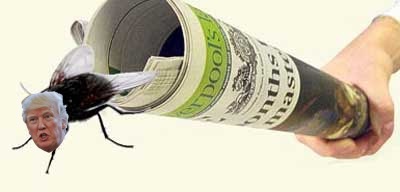Congresswoman Kristi Noem thinks it’s really important that the International Trade Commission yesterday overturned the Trump newsprint tariff:
“Local newspapers document the heartbeat of small town South Dakota, but unnecessary newsprint tariffs have threatened their survival,” Noem said. “Getting these tariffs nullified was an important and hard-fought victory for more than 125 local newspapers in South Dakota, whose reporting strengthens our sense of community and connection” [Rep. Kristi Noem, “ITC Reverses Newsprint Tariff After Noem Fight,” press release, 2018.08.29].

Rep. Noem headlines her “fight” to reverse the newsprint tariff, but her tacit post hoc ergo propter hoc claim (translation from Latin: Rain Falls After Noem Washes Car) obscures the fact that she couldn’t stick around in Washington long enough this summer to get her bill a committee hearing. Her press release carefully ignores mentioning the man who imposed the tariff, Donald J. Trump. The statement runs interference for Trump, saying tariffs are “trade remedies that are intended to protect” out local communities. The independent, bipartisan ITC found without dissent that Trump’s claimed “intent” had no basis in fact:
The United States International Trade Commission (USITC) today determined that a U.S. industry is not materially injured or threatened with material injury by reason of imports of uncoated groundwood paper from Canada that the U.S. Department of Commerce (Commerce) has determined are subsidized and sold in the United States at less than fair value [USITC, press release, 2018.08.29].
Trump acted without factual basis to support one financial fatcat with a tariff that could not legally continue:
The Commerce Department had imposed the tariffs in response to a complaint from a hedge-fund-owned paper producer in Washington state that argued that its Canadian competitors took advantage of government subsidies to sell their product at unfairly low prices.
The department had revised the tariffs lower in a decision earlier this month, though newsprint buyers still would have been hit with an anti-dumping levy of up to 16.88 percent and anti-subsidy duties of up to 9.81 percent.
But under U.S. law, the two-part process for making the tariffs permanent also requires the ITC to find that the U.S. paper industry was harmed or threatened by the imports from Canada. The commission unanimously determined that no injury is occurring [Keving Freking, “Tariffs on Imported Newsprint Nixed in Win for US Newspapers,” AP via Kansas City Star, 2018.08.29].
The Trump newsprint tariff also fits the modus operandi of the Trump White House to weaken the free press at every turn and undermine the public’s ability to learn hard facts about this White House’s failures of policy and character:
When pundits bemoan Donald Trump’s “war on the media,” they’re typically referring to the illiberal sentiments he disseminates in his Twitter tirades and rally rhetoric. And there’s no question that the president’s relentless attempts to undermine all non-progandistic sources of political information — and to demonize those who supply it — are worth bemoaning.
But while Trump’s tweetstorms about “Fake News” were dominating the headlines, his administration was waging a much more concrete and consequential war on the Fourth Estate….
It is unclear whether the president understood the implications his newsprint tariffs would have for local journalism when he first put them in place. But everything he’s done since taking office suggests that he would view collateral damage to the Fourth Estate as a feature of his trade policy, not a bug [Eric Levitz, “Trump’s Quiet Assault on Small Newspapers Just Came to an End,” New York Magazine: Daily Intelligencer, 2018.08.29].
Madison Daily Leader publisher Jon Hunter agrees that the Trump tariff threatened the First Amendment:
“It’s great news, frankly,” Hunter says. “You can expand it not only to companies that operate newspapers, but really the first amendment and a free press. High prices for all those kind of things would have discouraged and maybe even closed some papers, so it’s good for America” [Lee Strubinger, “Newsprint Tariffs Roll Back, SD Newspapers Cheer,” SDPB Radio, 2018.08.29].
Congresswoman Noem is right: the ITC’s rollback of the Trump newsprint tariff is important. But the tariff repeal is not important because it shows she’s a fighter; it’s important because it shows she’s not fighting hard enough against a destructive White House that acts on anti-Constitutional (read: tyrannical) impulse rather than fact and the general welfare.
That was a cheap tactic on Noem’s part, based on distorting her role, which was less than minimal. How trumpian of her.